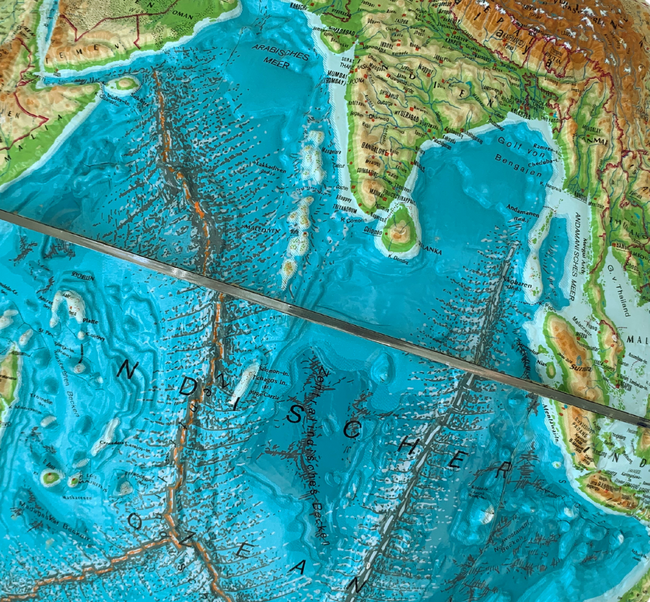30.07.2024 | Die Modellierung von Erdsystemen steht in diesem Sommer im Fokus der Mittwoch-Mittags-Seminare am ZMT. Der wissenschaftliche Direktor Raimund Bleischwitz hat im Rahmen der dieser Sommereihe renommierte Experten eingeladen, Vorträge zu Themen der Moellierung zu halten.
Die Wissenschaftlerinnen und Wissenschaftler, unter anderem vom Hereon, PIK, der ETH, dem Ruđer Bošković Institut oder der Southampton University, werden ein breites Spektrum an Modellierungsthemen abdecken, das vom Ozean-Klima-Nexus über Küstenökosysteme bis hin zur Erdsystemmodellierung oder Nährstoffflüssen reicht.
Die Veranstaltungen stehen in Zusammenhang mit der strategische Institutserweiterung "Modelling socio-economic dimensions across Tropical Coastal Ecosystems and the Earth System – TropEcS", mit der sich das ZMT noch direkter als Schlüsselakteur in der Modellierung des tropischen Küstenklimas, der Auswirkungen des Klimawandels auf die menschliche Bevölkerung an tropischen Küsten und der Entwicklung von Reaktionsstrategien positioniert.
Die Seminarreihe findet jeweils mittwochs ab 12:00 Uhr im großen Seminarraum des ZMT und online über Zoom statt (Zoom-Link: https://us02web.zoom.us/j/88963632392?pwd=6PtsrWnfjVLK7j9bYHtonKenaeRhMb.1)
Hier eine Übersicht der ersten Vorträge:
1. Juli, 12:00 - 13:00 Uhr
Dr. Clea Lumina Denamiel, Ruđer Bošković Institute, Division for Marine and Environmental research.
This talk will be on Modelling challenges and perspectives in the ocean/climate nexus along questions and topics of relevance and interest for ZMT (What's at stake for coastal regions in light of increasing weather extremes and other impacts; Downscaling climate models to regional scales: what's missing and possible advancements; Modelling perspectives from a regional view: forecasting, digital twins, addressing data gaps; Implications for adaptive response strategies in coastal planning).
24. Juli, 12:00 - 13:00 Uhr
Titel: Coastal ocean CO2 uptake and climate feedback variability
Dr. Moritz Mathis, Hereon, Earth System Modelling,
Abstract: The coastal ocean is a dynamic environment connecting the land and ocean as the two primary sinks in the global carbon cycle. Quantifying coastal carbon fluxes is thus relevant for understanding the controls of the Earth´s climate and addressing impacts of climate change mitigation efforts. Yet, ongoing global carbon budgeting initiatives highlight the need for further investigation of the land-ocean transition zone to constrain uncertainties in carbon burial, transport and air-sea gas exchange. I will present the global ocean-biogeochemistry model ICON-Coast, which seamlessly integrates the coastal ocean in marine carbon cycle modeling. Results from hindcast simulations provide insights into the main drivers of the increasing CO2 uptake of the coastal ocean. I will show that biological responses to climate-induced circulation changes and riverine nutrient inputs are key to the enhanced coastal uptake, and lead to a net CO2 flux density that is higher than in the open ocean. However, coastal climate feedback mechanisms, such as the loss of Arctic permafrost organic carbon due to increasing coastal erosion, regionally modulate the air-sea CO2 exchange and its interannual variability. These results emphasize the importance of understanding region-specific dynamics of the marine carbon cycle to comprehend and predict drivers and impacts of global climate change.
31. Juli, 12:00 - 13:00 Uhr
Titel: Insights into coupled Earth-system modelling and perspectives on applications in regional coastal tropical systems
Dr. Georg Feulner, PIK, Earth System Analysis
21. August, 12:00 - 13:00 Uhr
Title: Modelling marine biogeochemical extreme events: Distribution, characteristics and impacts
Abstract: Marine biogeochemical extreme events, associated with ocean warming, deoxygenation and acidification have been observed to increase in their frequency, intensity and spatiotemporal extent, with the 2014-2016 North Pacific Blob an example for a severe and long-lasting compound extreme event. Potentially acting as harbingers of future climate change, these extremes are associated with substantial changes in marine ecosystem composition and functioning. Here, we use regional and global marine ecosystem and Earth System models to understand the drivers, distribution, characteristics and impacts of biogeochemical extremes over the historical time period. Using pteropods as an example study taxon, we discuss a range of habitat-based, ecological and physiological metrics to quantify and attribute impacts on marine ecosystems.
Dr. Meike Vogt, ETH Zurich, Department of Environmental Systems Science
27. August, 12:00 - 13:00
Titel: Making microbes part of the equation
Prof. Dr. Sinikka LennartzProf. Dr. Sinikka Lennartz, Universität Oldenburg
Abstract: The ocean hosts an enormous diversity of microorganisms, which are the main drivers of biogeochemical cycles and control major carbon reservoirs. However, their influence on marine biogeochemistry is not yet adequately represented in global ocean models. This shortcoming reduces our ability to project biological feedbacks in future scenarios. In this talk, I will present examples of how we connect field observations, experiments and theory to inform biogeochemical model development with a focus on dissolved organic carbon (DOC) and microbial interactions. Our results so far have highlighted that microbial processes determine the distribution of DOC on basin-scales, and are closely linked to the cycling of macronutrients. Taking these microbial influences into account suggests that the marine DOC pool may be much more variable than previously thought. The close linkages to nutrient cycles also have potential implications for a future, more stratified ocean, in which nutrient concentrations are projected to decline. By using a microbial community model, we show that nutrient concentrations may influence the balance between cooperation and competition in microbial communities, which impacts the partitioning of dissolved and particulate organic carbon.
28. August, 12:00 - 13:00 Uhr
Titel: Title: The impact of future climate at the seabed
Dr. Lucy Bricheno, National Oceanographic Centre, Marine Systems Modelling





